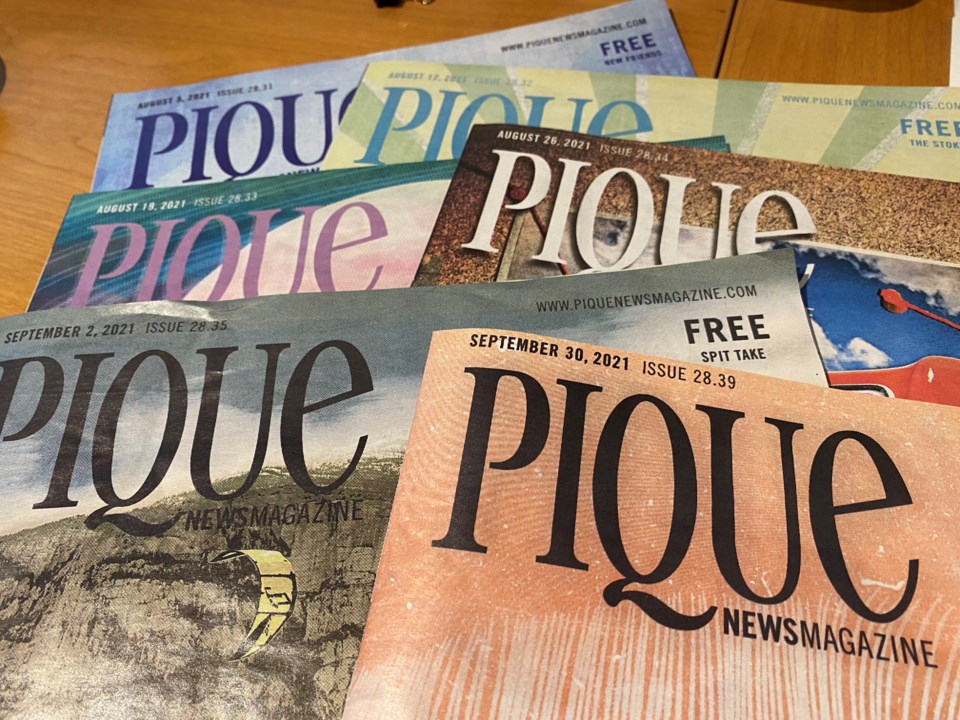This is an important week.
It is National Newspaper Week, and it is a time when I usually think deeply about one of the things that matters most to me in the world—bringing my community of readers relevant, meaningful, useful, informative and trustworthy news.
It is not news that over the last several years social media has radically altered how and where we consume news and information, and there are inherent dangers in this.
All too often readers accept what they find on Facebook, Twitter, Instagram and even Snapchat as gospel when it is not.
And this has really threatened the news industry.
This past year, while we may no longer have a U.S. president that made us all think the proverbial court jester was in charge, the pandemic has brought out just about every crazy person on social media. Add a federal election in there, and well, you get the picture.
You won’t be surprised to read that every reporter and columnist at Pique gets a healthy number of emails, comments, texts, phone calls and even the occasional letter calling us out for information or opinion in an article. We do our best to listen and engage professionally with those who take the time to reach us, even when they are hostile.
And I hope that most of them come to understand that we rely ourselves on trusted sources of news, and that this is always the basis of what we report.
I would argue that only by the news media providing you the reader with informed information can you think critically about what is happening around you and form opinions.
A colleague, Gordon Cameron, the managing editor for Metroland’s Hamilton Community News, the Sachem and the Glanbrook Gazette said this in his editorial for National Newspaper Week: “Too often, debates move from what should be a free exchange of ideas into a no-holds-barred, zero sum game clash for the ages.
“It’s bad because with that winning-is-everything mentality, the lines between truth and ‘truth’ get blurred. Inconvenient facts get ignored, projections are presented as certainties and counter arguments are dismissed with only the flimsiest of pretexts. Not only that, the tone can range from haughty and superior to ridicule and outright bullying.
“And that’s no way to come to a decision in a functioning democracy. It’s supposed to be the rule of the people, not the rule of the loudest.”
I echo this sentiment.
Consider the fact that according to a 2019 international public opinion poll conducted by Ipsos Public Affairs, a whopping nine in 10 Canadians say they have fallen for fake news. Tragic.
But the truth can’t be faked. The truth does not have an opinion, it doesn’t care if it agrees with your opinions or not, and Pique’s job is to bring you the truth so that you can have an informed opinion.
Local newspapers have a complicated and symbiotic relationship with their readers and social media followers. We need each other. That is one of the reasons it is so frightening to consider the news deserts that are appearing across Canada as the community news industry faces an almost extinction-level event struggling with the impacts of revenue losses due to COVID-19 and the rise of social media platforms. About 30 community newspapers have closed across our country in the last year, while 182 media outlets have reported layoffs or job losses. A total of 17 companies with multiple media holdings also reported layoffs or job losses.
More than 1,200 employees (journalists and other workers) were laid off during the pandemic, according to data collected by the COVID-19 Media Impact Map for Canada, a joint project by online publication J-Source, the Canadian Association of Journalists and the Local News Research Project at Ryerson University’s journalism school.
We hope we are inspiring you, informing you and connecting you. We hope, like those here at Pique, that you will champion the truth, and we hope that readers understand the link between a strong media, democracy and the media’s role in keeping a watchful eye on powerful institutions on behalf of the public.




